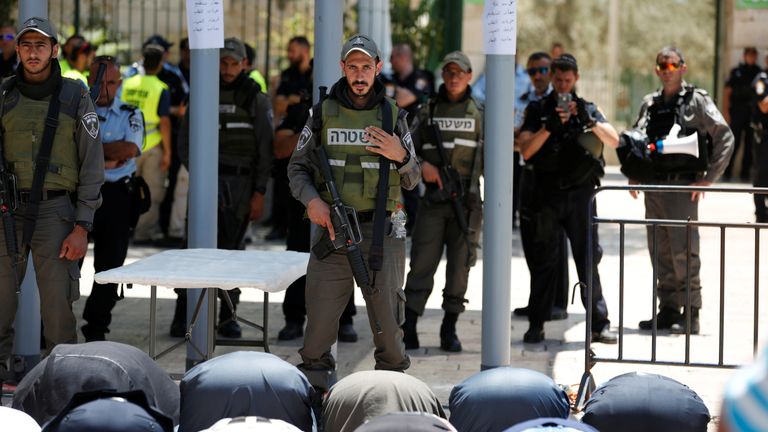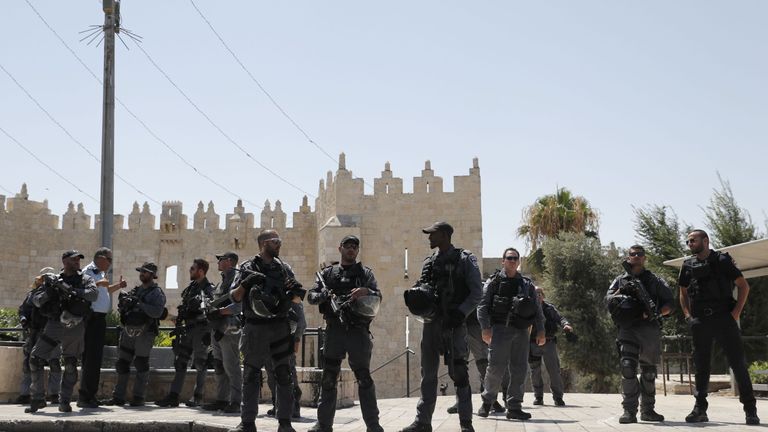Palestinians clash with Israeli forces at al Aqsa in Jerusalem
The installation of metal detectors outside the al Aqsa/Temple Mount following an attack on police have caused tensions to rise.
Friday 21 July 2017 08:54, UK
A standoff between Israel and the Palestinians and the wider Arab Islamic world over the screening of Muslim worshippers with metal detectors outside the al Aqsa/Temple Mount compound in Jerusalem appears to be escalating dangerously following the killing of two Israeli policemen last Friday.
There have now been almost daily clashes with police at the entrances to the holy site.
Religious clerics from the Waqf - the Jordanian trust which manages the site - have implored Palestinians not to enter the area as they claim that would legitimise Israel's unilateral decision to change the status quo.
They have also asked every mosque in the city to close on Friday and are urging all worshippers to head instead to the gates of al Aqsa for prayers - a move which could result in ugly clashes.
Israel claims the new measures do not alter the 'status quo' and the metal detectors are a necessary security requirement.
The magnetometers were placed at the entrance to the compound - known as the Temple Mount for Jews and the Noble Sanctuary for Muslims - after three Arab Israelis attacked an Israeli patrol near Lion's Gate six days ago, killing two policemen.
The three attackers, from the city of Umm al Fahm, were all killed by Israeli security forces.
Dramatic mobile phone video footage shows the moment one of the men was shot dead after he had tried to escape into the compound.
The use of firearms in the religious complex, which it seems were also stored there, is a major escalation and a clear 'red line'.
Following the attack Israeli police closed the Mount/Noble Sanctuary to carry out searches.
Israel says the site cannot be used ever again as a staging post to launch "terror" attacks; hence the extra security.
Israeli Government spokesman David Keyes said: "Two Israeli police officers were murdered on the Temple Mount by terrorists who smuggled in guns... Magnetometers are vital for security. That's why they are at the Western Wall and at holy sites around the world."
But for the Palestinians and the wider Arab world the new measures do constitute a change to the 'status quo'.
The international community considers East Jerusalem - where the holy sites are situated - to be under Israeli military occupation.
Access to the al Aqsa compound is already difficult - or impossible - for many Palestinians.
Different residency rights, introduced by Israel since it captured the West Bank, Gaza and East Jerusalem in the 1967 Six day War, mean that it is now, in some cases, easier for a Palestinian living in the West Bank to go abroad than it is to visit Jerusalem.
The Palestinians claim the extra security is another effort by the State of Israel to make access more difficult and deny them their basic rights, further delegitimising them as citizens of the city.
The Temple Mount/Noble Sanctuary complex is a symbol, both real and figurative, of the decades-long struggle between the Israelis and the Palestinians.
In the religious and national narratives of both Israel and the Palestinians it is a huge immovable, inflexible edifice.
If nationalism is simply just the story a people tells itself then Jerusalem is central to the plot of both movements.
For the Jewish people the Temple Mount is the holiest site in their religion.
It is where the First and Second Temple were built.
It is also the site of the the foundation stone, the bridge between heaven and earth, and the place where Abraham offered to sacrifice his son Isaac as a test of faith.
Jerusalem feeds the modern State of Israel's claim to the land: the story of Israel is inexorably linked and weaved with the story of the place that it claims as its "eternal and undivided" capital.
But the Holy Esplanade is also sacred for Muslims and central to the Palestinians' national drama.
It is the third holiest site after Mecca and Medina. It was the destination of the Prophet Mohammed's night journey on a winged horse - al Aqsa means 'the furthest' - and it is from there that he as God's messenger ascended to heaven with the Angel Gabriel.
The Palestinians claim East Jerusalem as their capital.
They want it to be recognised as their first city as part of a two state solution.
Who has control over the holy sites is a contentious issue and one that can provoke outbreaks of violence very easily.
When former Israeli Prime Minister Ariel Sharon visited the site in 2000 (he was leader of the opposition Likud party at the time) it triggered the Second Intifada .
That horrifically violent uprising - which lasted five years - saw a wave of suicide bombers striking across Israel.
To say that the issue of al Aqsa is combustible is to be a master of understatement.
The present status quo dates back to the Ottoman period.
Under that arrangement only Muslims have the right to worship on the plaza, although Jews and people from other faiths can visit.
And since 1967 when Israel captured the old city it has remained committed to that formula.
But many Palestinians believe - despite Israel's repeated denials - that there is an ongoing campaign to change the access and worship rights at the complex and even partition the area.
The issue for now may ostensibly be about the metal detectors but what they represent in a wider sense is the source of the explosive reaction that is currently brewing.







